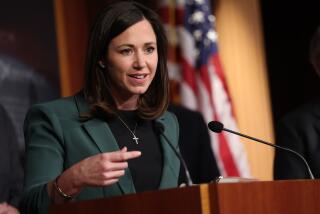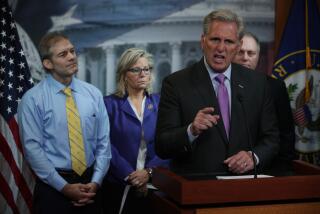Obama faces questions at home over Libya policy
- Share via
President Obama was safely back in Washington after his slightly shortened trip to Latin America, preparing on Thursday to deal with questions about his policy on Libya, which is under attack from several, sometimes contradictory angles.
It was Sarah Palin, freshly back from his her own globe-trotting, who captured the mood of one stream of the Republican opposition to Obama’s military intervention in Libya.
“I would like to see, of course, as long as we’re in it -- we better be in it to win it,” Palin, a Fox News contributor, told Fox host Greta Van Susteren. “And if there’s doubt, we get out.”
There has been criticism over Obama’s actions both from Democrats and Republicans, from anti-war liberals and from neo-isolationist conservatives. Lawmakers have complained they have been snubbed and their constitutional prerogatives usurped by the executive ordering military attacks as part of an international mission to protect civilians fighting to oust Moammar Kadafi.
But the criticism creates a special problem for Republicans, who are seeking to unseat Obama and capture the Senate in 2012, while retaining control of the House. There is no reason the GOP should speak in just one key, but the abundance of notes illustrates the party’s various strains as it seeks a harmonious voice.
The major GOP criticism is that Obama’s policy, allowing U.S. air power to support a no-fly zone for humanitarian goals, is confusing. “Because of the conflicting messages from the administration and our coalition partners, there is a lack of clarity over the objectives of this mission, what our national security interests are, and how it fits into our overarching policy for the Middle East,” House Speaker John A. Boehner wrote in a letter to the president. Is the goal to remove Kadafi?
The administration has tried to walk a fine line on the issue. During his trip to Latin America, Obama insisted that U.S. policy was that Kadafi had to go, but that the goal of the military action was far more limited, to protecting civilians. The distinction is important under international law, and for a nation still fighting two other wars. But it has been politically unsatisfying for the more hawkish wing of the GOP, which also wants a clearer definition of the U.S. role as the central player. Obama has said the control of the no-fly mission will be turned over to European allies either directly or through NATO in the coming days.
“I think the point is that we’re not leading with the airstrikes, and I think this is turning into much more than just allowing a no-fly zone to be enacted,” said Palin, who is always mentioned as a possible GOP presidential contender in 2012. “We’ve received different messages from our president and from his advisors as to what it is that we are doing there and what the mission is. And I think Americans are ready to hear, really, what’s the mission. And are we really going to turn over command and control to the Arab League and to the British and to the French? And when do we reclaim our command and our control over our troops? So that’s just one of the big questions,” she said in the Fox interview.
Mississippi Gov. Haley Barbour touched on the leadership theme in a radio interview with Paul Gallo: “Well there are two very big, but separate issues. One is leadership. And since World War II, the world has looked to America for leadership. But we haven’t provided leadership in this administration. In fact, the Obama administration’s position has been to say, you know, we’re just one the boys, so we’re not going to try to be the leader. And we see that when you don’t have strong leadership from the strongest country in the world, that everybody else scatters out and breaks up. The other question though, is what are we doing in Libya?”
As the situation in Libya has changed so has the types of criticism. Newt Gingrich, another possible GOP presidential aspirant, initially supported a no-fly zone earlier in March but in recent days has apparently changed his mind, prompting a spate of media criticism that he has flip-flopped. Speaking on NBC’s “Today” show, Gingrich said, ”I would not have intervened. I think there were a lot of other ways to affect Kadafi. I think there are a lot of other allies in the region we could have worked with. I would not have used American and European forces.”
Gingrich fell back on what seems to be the default GOP position: “It is deeply troubling that there is so much confusion, lack of foresight, and little resolve coming from the president and his administration about what our mission and goals must be in the Libya engagement,” Gingrich remarked in a posting on Facebook.
Like some of their Democratic colleagues, Republicans in the Senate also worry whether their constitutional prerogatives to wage war or even to be consulted have been trod upon by Obama.
As Sen. John Cornyn (R-Texas) wrote in a recent tweet: “Is Congress going to assert its constitutional role or be a potted plant?”
michael.muskal@latimes.com
Twitter.com/LATimesmuskal
More to Read
Get the L.A. Times Politics newsletter
Deeply reported insights into legislation, politics and policy from Sacramento, Washington and beyond. In your inbox twice per week.
You may occasionally receive promotional content from the Los Angeles Times.








